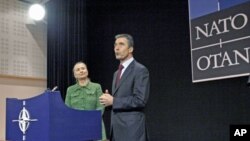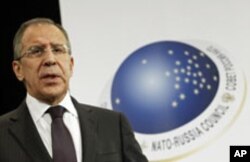There were no breakthroughs in NATO and Russia's long-standing disagreement over European missile defense Thursday during the NATO-Russia Council meeting in Brussels.
Speaking to the press after the NATO-Russia Council meeting, U.S. Secretary of State Hillary Clinton said the missile defense shield is about protecting the alliance from a potential threat posed by Iran. She added that it poses no threat to Russia’s strategic defense.
“It does not affect our strategic balance with Russia and it is certainly not a cause for military counter measures," said Clinton. "That said, no ally within NATO is going to going to give any other country outside the alliance a veto over whether NATO protects itself by building a missile defense system against the threats that we perceive are the most salient.”
Russia says it is prepared to respond to NATO’s missile defense plans by deploying missiles in areas neighboring the alliance. Referring to the Cold War, NATO chief Anders Fogh Rasmussen said that such a response is a reminder of a “confrontation of a bygone era.”
Speaking after the NATO-Russia Council meeting, Rasmussen said the North Atlantic alliance has been listening to partner nation Russia and is taking its concerns seriously.
“This is also the reason why I have repeatedly stressed that the NATO missile defense system is not directed against Russia. We do not consider Russia an enemy. We consider Russia a partner, and we want to develop a true strategic partnership as we decided one year ago in Lisbon,” said Rasmussen.
Speaking through a translator after the meeting, Russian Foreign Minister Sergei Lavrov accused NATO of repeatedly downplaying Moscow's concerns during missile defense negotiations
“Indivisible security is not a menu from which you can pick and choose items you like and reject items you don't,” said Lavrov.
Lavrov insisted that Russia has reason to be concerned, saying that the shield's planned radar would duplicate existing facilities and cover a substantial portion of Russian territory.
“And they tell us, ‘No, no, no, there's no need for any discussions or arrangements, we already finalized a scheme and this is the best possible option, and it is not targeted against you.’ But when we start giving facts demonstrating it does create risks to us, they just keep repeating, ‘No, no, not to worry. It is not targeted against you,’” said Lavrov.
A U.S. senior state department official, speaking on condition of anonymity, said Russia wants a guarantee that the missile defense shield will never undermine Russia’s strategic military deterrent, regardless of changes in circumstances, leadership or technology. The State Department official said it would be impossible to make such a commitment.
NATO and U.S. officials say they hope to reach an agreement on the subject by the middle of next year.





